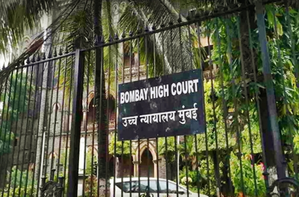Saline bottles hung on strings for food-poisoning patients: Bombay HC seeks Maha govt affidavit
By IANS | Published: February 23, 2024 05:14 PM2024-02-23T17:14:28+5:302024-02-23T17:15:05+5:30
Mumbai, Feb 23 Taking cognizance of the Buldhana mass food-poisoning episode in which over 200 people fell ill ...

Saline bottles hung on strings for food-poisoning patients: Bombay HC seeks Maha govt affidavit
Mumbai, Feb 23 Taking cognizance of the Buldhana mass food-poisoning episode in which over 200 people fell ill after consuming 'prasad' following which they were administered saline from bottles hung on strings, the Bombay High Court has directed the Maharashtra government to file an affidavit on the incident.
The victims were rushed to local hospitals where they were made to lie on mats or bedsheets, and administered saline from rows of bottles dangling from strings attached to trees, ostensibly owing to shortage of beds due to the sudden influx of patients.
On the intervening night of February 21 and 22, over 200 people, including women and children fell ill after partaking in the 'prasad' (meal) at a week-long religious 'Harinam Saptah' held in Somthana village, sparking a furore.
Taking note of the incident, a division bench of Bombay High Court comprising Chief Justice Devendra Kumar Upadhyay and Justice Arif S. Doctor asked the state government to explain within 10 days the circumstances of giving saline from the bottles hung on string to the patients.
Amicus Curiae Advocate Mohit Khanna raised the issue before the judges during the hearing of a PIL on the deaths of multiple patients at government hospitals in Nanded, Chhatrapati Sambhajinagar and other places in 2023.
Highlighting news reports and social media videos, Advocate Khanna cited the serious problem arising out of the medical emergency and lack of infrastructure issues.
Government Pleader P.P. Kakade submitted a preliminary report on the crisis, saying that around 150 patients were rushed to a nearby 30-bed Bibi Hospital, and the rest to other hospitals like Mehatar and Lonar in the district.
However, owing to a shortage of beds there, the patients were given treatment and administered saline under a temporary arrangement, he said.
Kakade pointed out that though these hospitals had all required stocks of medicines for the patients, they could not treat the victims in-house owing to bed shortages.
Moreover, since the illness was not serious and a stomach ailment, all patients were out of danger and discharged the following day (February 22), he told the judges.
The bench enquired how far the district hospital was from the village and whether they could not be shifted there. It also questioned the implications if the patients were indeed suffering from a serious affliction.
Kakade responded that the district hospital was 100 km away, and it was possible to transfer them to bigger hospitals, but everybody got discharged the next day.
On this, the court directed the government to file an affidavit on behalf of the concerned authority within 10 days, after which the matter will be heard again.
Soon after the incident, the district authorities ordered a probe while the police collected samples of the 'prasad' items served there for forensic analysis to determine the cause of the mass food-poisoning.
Disclaimer: This post has been auto-published from an agency feed without any modifications to the text and has not been reviewed by an editor
Open in app